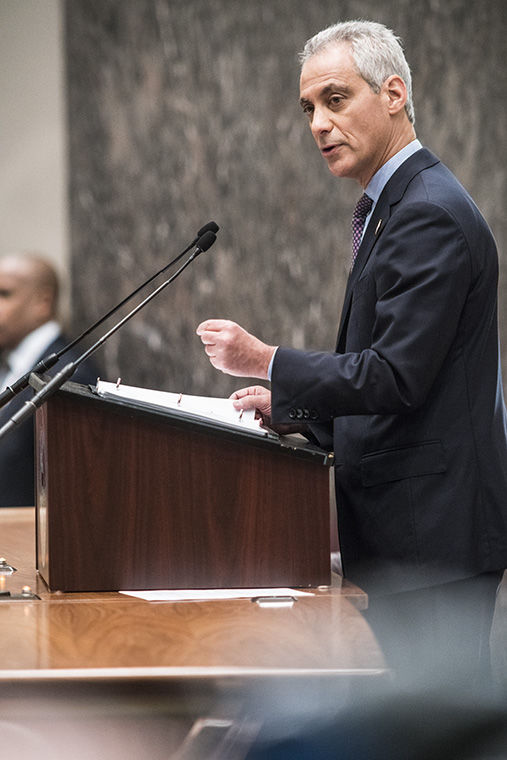Emanuel: ‘Chicago is back on solid ground’
Mayor Rahm Emanuel pointed to the city’s lower budget shortfall after increasing taxes and fees during his budget address Oct. 11 City Council speech.
October 17, 2016
Mayor Rahm Emanuel addressed the need for a balanced city budget by cutting costs, while replenishing Chicago Police Department forces, summer jobs programs and investing in the city’s youth at the same time.
While many Chicago residents are frustrated with new property and water taxes, Emanuel emphasized positive results in his 2017 Budget Address speech at City Council’s Oct. 11 meeting.
“Five years ago, Chicago was on the financial brink,” Emanuel stated. “Today, Chicago is back on solid ground.”
Chicago was facing an operating budget shortfall of $635 million when Emanuel took office in 2011, and in 2017 the shortfall will be $137.6 million, according to Emanuel’s proposal.
The savings come from $33.7 million in spending cuts and city reforms, including $9.4 million in energy, $17.5 million from justified expenses, $1.3 million from lease mergers, $3.5 million for the sale of excess city-owned land and $2 million from reducing printing and copier costs.
The city has already increased its revenue through lease taxes, the new water and sewer service tax and the proposed 7-cent tax on paper and plastic bags, according to Rojhat Avsar, an associate professor in the History, Humanities & Social Sciences Department who teaches economics.
In his budget speech, Emanuel announced that the city would be replacing and upgrading streetlights with 270,000 LED lights over the next four years—starting in December —which will provide energy savings.
Another element of the proposed budget is updating Chicago’s 3-1-1 service. By 2019, residents will be able to tweet and text the city to report potholes, streetlight failure and other concerns.
“Chicago’s 3-1-1 system must be modernized so it can join the 21st century,” Emanuel said. He also noted this would not be paid for with revenue from new taxes.
The mayor also cited the youth mentor and job outreach programs, which he announced at his Public Safety Strategy speech at Malcolm X College Sept. 22.
A total of $64 million will fund these and other projects, providing 7,200 Chicago Public School students with a mentor.
Other programs in Emanuel’s 2017 budget will expand the city’s summer jobs program, and implement after-school activities and free eye care for nearly 60,000 and free dental care for more than 100,000 CPS students.
“When we invest in our children’s future, we let them know they can believe in their future,” Emanuel said.
Frank Chapman, field organizer for the Chicago Alliance Against Racist and Political Repression, said he thinks the mayor’s community outreach programs are not enough, and he is taxing the wrong demographic.
“[Emanuel] has not taxed the rich and made them pay their fair share,” Chapman said.
Avsar said while the Emanuel administration has lowered the budget shortfall through new taxes and fees. The economic recovery after the 2008 recession has also allowed the city to implement new avenues of revenue.
“When the economy grows, the city collects more,” Avsar said.
Avsar said budget shortfalls are difficult to fix in the short term, and a long-term plan along with robust economic recovery is needed.
Chapman and his organization, which promotes an elected civilian review board for CPD, said the budget is disproportionate.
“Why is the police getting 40 percent of the budget?” Chapman said. “That is an injustice.”
In the mayor’s speech, Emanuel reminded citizens that work on Chicago’s financial difficulties is not finished, and added everyone will have to sacrifice.
“The next chapter is to advance our finances from stable to secure,” Emanuel said. “It is about looking toward a future that is no longer burdened by our past mistakes.”








